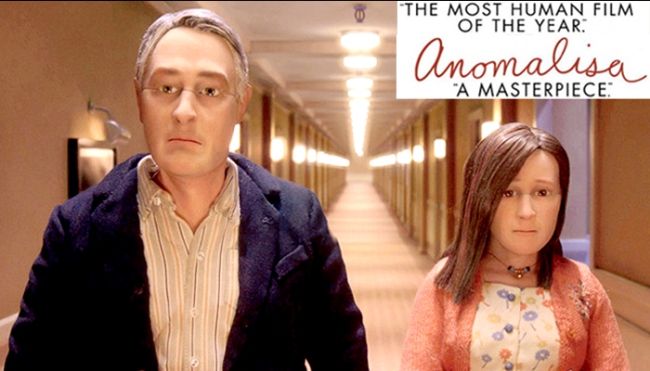 February
05
February
05
Tags
Anomalisa (2015)

It’s risky to hype an animated film as a “masterpiece” but calling it the “most human movie of the year” is particularly brave. As we know, marketing is the art of labelling faults as virtues and in this case the hype disguises the film’s absence of humanity, morality or narrative purpose. Filmed entirely in stop-motion animation, it uses innovative technology to produce an emotionally vacuous tale based entirely on one of the oldest clichés in storytelling: a successful male’s mid-life neurosis about his shallow existence and his existential dilemmas.
While many audiences will find cleverness in the script, if it were delivered by human actors it would be bland and even ridiculous. This means that the entire production rests on audiences finding it amusing to hear puppets speak deep and meaningful thoughts, similar to movies where dogs or horses say cute things in a local accent. This time bland is given new meaning as every ‘character’ has the same voice except for Lisa’s, the anomaly whose name is embedded in the title. While this device may be intended to emphasis her individuality in his mundane life, it actually results in a monotonous soundtrack un-suited to probing “what it means to be human” as if an animated movie with expressionless puppets might have the answer.
Of course, it’s a powerless, uneducated and insecure female who is the inevitable victim of yet another middle-age male melt-down over self-identity, marital and girlfriend issues. When the permanently apologetic Lisa is discarded after a one-night stand she drifts into soft-focus while his crisis anchors the semi-climax. Clay animation techniques are slow and detailed, and the patience to create almost 120,000 separate frames is unimaginable. But this may be the metaphor for the film’s major failing. It dwells so heavily on the minutiae of technique and script sophistry that it overlooks its reliance on an old and dated narrative cliche. While it is an entertaining, original and interesting attempt to go somewhere different, for me it felt like a Muppets episode narrated by Aristotle. The mixture of painful souls, copulating puppets, and animatronics is just too weird.
Directors: Charlie Kaufman and Duke Johnson 
Voice Stars: David Thewlis, Jennifer Jason Leigh, Tom Noonan

Interesting take. Thanks for the feedback on my review. I’m not sure I agree with the premise that she is a powerless victim of this middle-aged man’s mid-life crisis. She went into their encounter with her eyes open and seemed to come out of it empowered and changed for the better whereas he got worse. She was not the fix to his problems that he thought she would be, and I think the film shows the foolishness on his part to think that she would be. In fact, I think the message of the movie might lie in his self-absorption. He is oblivious or doesn’t care about others, only insofar as they relate to his problems and concerns, and that shows in how and why he looks up his ex-girlfriend, the “toy” he buys his son, the way he views others as looking and sounding the same, and where things end up with Lisa.
LikeLiked by 2 people
Great riposte Ken; I’m almost convinced you are right. But the facts are that this is a male-centric existential dilemma, and poor Anomalisa is his prop for working out who he is. I see Lisa as an exploited accessory to his problem, but the bigger question is can animated puppets advance our understanding of the human condition? Thanks for engaging with this debate.
LikeLike
I struggled a little with one. I can see what Kaufman was going for and as much as it was clever, it was also a bit dull. Again, I reckon that was the whole point but it didn’t make for much entertainment. Loved the significance of the “toy”, though. Great way to bring it all together.
LikeLiked by 1 person
Sure the story could have been better but I appreciate the originality. I agree that it would have been worse without the animation but at least it kept me somewhat engaged.
LikeLiked by 1 person